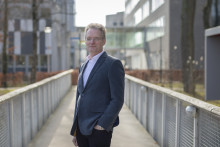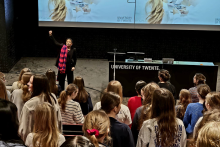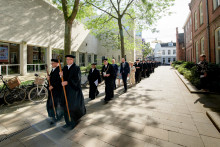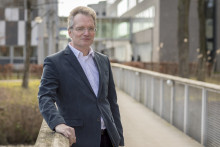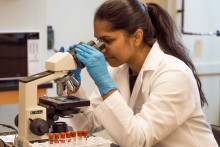HYPATIA CHairs
The UT aims to appoint at least ten female professors by 2020, also with the help of women-only Hypatia chairs. The chairs were introduced by the University of Twente earlier this year with the goal to increase the number of female full professors at the UT. The name was inspired by famous Greek scientist Hypatia, the earliest known female mathematician.
The Faculty of Electrical Engineering, Mathematics and Computer Science (EEMCS) began looking for appropriate candidates for its two Hypatia positions several months ago. At first, the procedure was hindered by the faculty council that disapproved of searching only for female candidates. However, Joost Kok proceeded with attempting to fill the Hypatia chairs – and not only through conventional means.
‘Besides the traditional ads we wanted to look into different ways of finding the right scientists,’ said Kok. ‘We decided to hire QSXL company. They conducted a market scan and helped us identify specific countries that we should concentrate on – based on the amount of female researchers in the country, their salary and how much research is produced in the country.’
QSXL produced a detailed report that shows head count and working conditions of female researchers in the higher education in European countries, with focus on the disciplines Electrical Engineering, Mathematics and Computer Science. ‘The results were definitely different than we expected and it helped us to look at places we otherwise wouldn’t,’ said Kok. Based on the research, QSXL recommended a list of countries for the EEMCS faculty to focus on. These are Portugal, Serbia, Austria, Slovakia, Ireland, Romania and Ukraine.
Focus countries per discipline
Mathematics: Portugal, Serbia, Austria, Slovakia
Computer Science: Portugal, Serbia, Austria, Ireland
Electrical Engineering: Portugal, Austria, Romania, Ukraine
Joost Kok stated that the faculty has used these findings to find suitable candidates and received a number of applications – from female, male and transgender candidates. ‘QSXL has helped us to personally contact handpicked scientists. It’s an ongoing process. We are still interviewing applicants, so I can’t share too much. After all, this approach was an experiment and we need to wait how it works out. But I have a positive feeling about it and I’m confident we will fill both Hypatia chairs at our faculty.’


